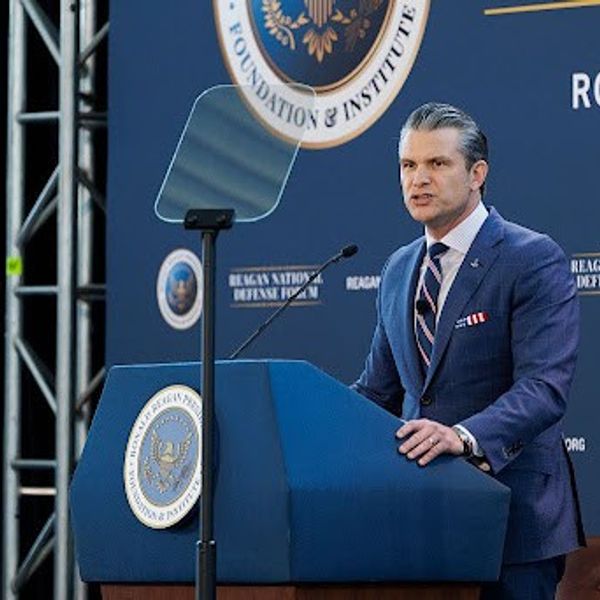OPINION — Israel’s Operation Rising Lion will go down as among the most impressive military campaigns in history. Military academies, military planners, and the Intelligence Community will study it for decades. More urgent, however, is that policymakers understand the importance of U.S. support in enabling Israel to advance our shared interests.
In less than a fortnight, Israel brought to its knees a major regional adversary, geographically nearly 75 times its size and 1,000 miles away. As we learned on a recent trip to Israel with the Jewish Institute for National Security of America, Israel—with crucial U.S. support—crippled Iran’s nuclear and missile capabilities, dismantled its air defenses, and decapitated its command and control. At the Pentagon’s request, Israeli pilots cleared the way for U.S. B-2 bombers.
Since first exposing Iran’s nuclear weapons program in 1994, Israel knew that it might need to take military action. Yet, June’s attack was only seven months in the making. At the end of 2024, a narrower plan based on precision strikes against a few nuclear facilities was shelved and a far broader campaign was developed from scratch—targeting not only the entirety of Iran’s nuclear supply chain, but its ballistic missiles, top generals, and leading nuclear scientists as well.
What made that sweeping operation feasible was an extraordinary string of Israeli successes since the brutal Hamas attack on October 7, 2023. Israel defeated Hamas, decimated Hezbollah, defended itself against hundreds of Iranian-launched ballistic missiles and thousands of drones, eliminated Syrian anti-air batteries, and knocked out Iran’s advanced Russian S-300 air defenses, opening an unimpeded corridor to Iran.
Suddenly, Iran was more exposed than at any point in the last forty years. The regime responded by accelerating both its nuclear weapons research and missile production. Israel now had both the opportunity and urgent need to act quickly and comprehensively against myriad Iranian targets.
Rapidly expanding its war plan required Israel to gather intelligence on hundreds of additional targets, develop new capabilities and operational concepts, and ready large numbers of personnel for new and unfamiliar missions. It wasn’t until earlier this year, for example, that Israel decided to use its full fleet of combat aircraft - including older F-16s - against Iran. And it was just days before the June 13 “go” date that the operation’s final pieces were put in place.
The extraordinary agility and ingenuity of Israel’s planning was exceeded only by the excellence of its military execution. The campaign started with a surprise attack that combined exquisite intelligence with perfectly synchronized operations—including stand-off weapons, forward-deployed drones, and clandestine ground teams—to eliminate Iran’s top military command and leading scientists in the war’s first minutes.
Drawing on the full-range of its advanced capabilities - including indigenously developed air launched munitions and complex cyber operations - Israel systematically neutralized Iran’s air defenses, establishing total air superiority from the Iraqi border to Tehran in just forty-eight hours. For the rest of the war, Israeli jets owned the skies over their greatest enemy’s capital. Operating without challenge, Israeli UAVs blanketed Iranian missile sites, providing persistent intelligence and hunting missile launchers before they could fire.
Need a daily dose of reality on national and global security issues? Subscriber to The Cipher Brief’s Nightcap newsletter, delivering expert insights on today’s events – right to your inbox. Sign up for free today.
Essential to Israel’s success were its two squadrons of F-35 fifth-generation fighters. Every strike package had several of them in the lead. F-15 pilots told us they felt less safe without an F-35 nearby. The aircraft’s next generation avionics allowed pilots to detect and defeat Iranian defenses that intelligence had not previously identified—even when they obscured their position by keeping sensors turned off until Israeli jets were near.
Israel’s achievements are extraordinary. For the first time, a U.S. ally has taken the lead, utilizing American weapons, in achieving a decades-long, bipartisan U.S. national security objective - preventing a nuclear Iran - and has dealt a serious blow to our most dangerous enemy in a part of the world that has long been deemed vital to U.S. interests, and, in doing so, has almost single-handedly transformed the Middle East’s balance of power in favor of the West.
This success was enabled not by the United States joining the fight, vital though that was, but by the decades-long U.S. investment in Israel’s ability to defend itself - through weapons sales, joint training and intelligence sharing. Not to mention Israel’s fierce determination to fight back.
The lessons for policymakers from Operation Rising Lion are clear: Israel is a U.S. national security asset and we need more allies equally determined and capable.
The Iran war is not yet over; if left unchecked, Iran may well reconstitute its nuclear program, ballistic missiles, or terrorist network. Russia remains an aggressor and China the pacing threat. The United States should find and support regional partners, like Israel. Provide them with the weapons, intelligence, advanced technology, and political support needed to address these threats.
That’s real burden sharing—a local partner prepared to carry the lion’s share of the responsibility, not to mention the fighting and dying, to counter shared threats.
General Charles Wald, USAF (ret.), served as the deputy commander of U.S. European Command. Lieutenant General Robert P. Ashley, USA (ret.), was the 21st Director of the Defense Intelligence Agency. Vice Admiral Mark Fox, USN (ret.), served as Deputy Commander of U.S. Central Command. All three are members of the Jewish Institute for National Security of America’s (JINSA) Iran War Assessment.
The Cipher Brief is committed to publishing a range of perspectives on national security issues submitted by deeply experienced national security professionals.
Opinions expressed are those of the author and do not represent the views or opinions of The Cipher Brief.
Have a perspective to share based on your experience in the national security field? Send it to Editor@thecipherbrief.com for publication consideration.
Read more expert-driven national security insights, perspective and analysis in The Cipher Brief

















